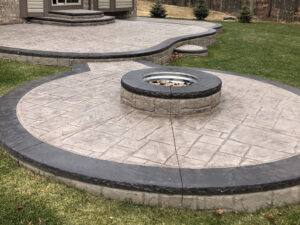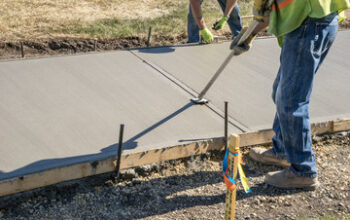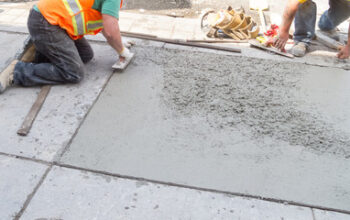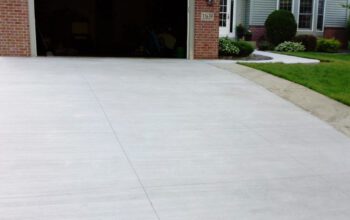Concrete Driveway is a great investment. It will not only add curb appeal to your home but also boost its resale value.
Concrete is non-flexible, so it is able to handle much heavier loads than other materials like asphalt. This makes it a great choice for commercial and garbage truck-heavy driveways.
Concrete is an extremely durable material, able to hold up well against heavy vehicles day in and day out for decades without cracking or breaking. Concrete is made from a mixture of stone aggregate, water, and cement binder. The type of stone used for the aggregate can range from sand to gravel-sized particles. When mixed and poured correctly, concrete is incredibly strong and versatile.
The strength of a concrete driveway is often increased by the use of rebar. Rebar is a metal rod placed within the concrete to reinforce it and add additional support, especially if the driveway is going to be subjected to heavy loads or traffic. Adding rebar to a concrete project can be costly, but it’s an effective way to make sure your concrete driveway will last for as long as possible.
Homeowners often opt for a concrete driveway because of its versatility when it comes to design options. Unlike asphalt, which is limited to a basic black or gray slab, concrete offers a variety of aesthetic options. It can be colored, stamped with a pattern, or made to look like brick. Many homeowners also choose to have their concrete driveways brushed, which creates a nuanced texture that’s more attractive than regular gray concrete.
Another popular option is a decorative concrete driveway, which uses regular concrete mixed with one or more types of aggregate to create a more interesting visual effect. This type of concrete is then sanded down to expose the aggregate, which can be done in a variety of ways to create a unique look that complements a home’s exterior treatment and landscaping plan. Homeowners should also consider using a concrete sealer on their driveway to protect the surface and prevent stains caused by automotive fluids and chemicals.
Easy Maintenance
Concrete driveways are a durable choice, but they’re not impervious to damage or wear. A few basic maintenance tips can help you get the most out of your driveway investment and minimize the need for repairs.
Keep your concrete driveway clean by sweeping regularly and using a blower to remove large debris. Similarly, rinse your concrete occasionally with a hose to remove dirt buildup and other contaminants. Oil stains are common on concrete surfaces and can cause the surface to deteriorate and crack, so always clean up any spills immediately with a biodegradable cleaner.
Another important tip for maintaining your concrete driveway is to patch problem areas as soon as you notice them. This will ensure that the area is fixed before it has a chance to worsen, and it will also prevent water from seeping into the damaged area and freezing, which can further damage your concrete.
Avoid using sharp tools or shoveling snow in the winter, as this can scratch or damage the surface of your concrete and lead to further deterioration and cracking over time. You should also try to avoid de-icing agents like rock salt, as they can corrode and damage your concrete driveway.
Be sure to plant trees and bushes far enough away from your concrete driveway so that their roots don’t penetrate the surface or create cracks in it. Finally, it’s a good idea to have your concrete driveway professionally sealed on a regular basis. This will protect the concrete from the elements, and it will make it easier to clean your driveway. It will also help to prevent water from freezing in the cracks and expanding them, which can eventually cause your driveway to crack and crumble.
Variety of design options
Concrete isn’t just a gray slab of material; it is a highly versatile design option. It can be stamped, etched, and tinted to match or complement your home’s color scheme. In addition, concrete can be given a variety of surface textures, such as washed finishes, broom finishes, and exposed aggregate. These options can give your driveway a look that would otherwise be impossible with pavers or asphalt.
A beautiful concrete driveway can enhance your curb appeal and add to the value of your property. It is also a long-lasting and durable choice that can handle even the heaviest of vehicles. It is a great choice for those who own recreational vehicles or multiple cars. A concrete driveway can also help you save on heating and cooling costs by retaining heat in the winter.
Unlike asphalt, a concrete driveway is impervious to oil and other car fluids that can damage the pavement over time. Adding a concrete driveway can prevent the need to regularly replace your driveway or invest in costly repairs over the years.
If you are interested in a more traditional look, consider adding pavers as an accent to your concrete driveway. They can add a sense of symmetry to your home and are easy to move or replace if you change your landscaping plans in the future.
A curved concrete driveway is another attractive and functional option for your home. It will require a bit more work on the part of your contractor to build, but it can be done at a reasonable price. It is a good choice for those who want a more formal look to their driveway and can complement many different styles of homes, including Colonial, Contemporary, and Ultra Modern.
Longevity
Concrete is an incredibly durable material that can stand up to harsh weather conditions, including snow and ice. However, like any driveway material, a concrete driveway will have to be maintained over time in order to keep it looking and functioning at its best.
There are several factors that affect the lifespan of a concrete driveway, including how it is installed, how much traffic it experiences, and how well it is maintained. Concrete that is poured on improper subgrade soil or with excessive water content can weaken it, causing cracking and other problems later. It is important to choose a professional installation team that understands the importance of properly preparing and compacting subgrade soil.
The amount of traffic a concrete driveway experiences can also affect its lifespan, as heavy traffic can lead to damage and wear and tear more quickly than light traffic. The sun’s UV rays can also break down concrete, especially when it is exposed to direct sunlight for extended periods of time.
Using salt de-icers on concrete surfaces can also decrease their lifespan by damaging the surface, so it is important to avoid using them as often as possible. Getting your concrete driveway professionally cleaned and sealed is also a good way to extend its lifespan.
A concrete driveway is a great choice for those looking for a long-lasting, customizable paving option that will add curb appeal to their home and increase its value. In addition, it is an environmentally friendly material that can be recycled and reused, reducing the need for additional energy to produce and transport new concrete materials. Its light color also helps reduce temperatures, as it reflects rather than absorbs heat.
Value
Concrete driveways can cost more upfront than gravel or asphalt, but they will last for decades and are considered an excellent investment. In addition, they typically increase a home’s value when compared to other driveway surfaces.
The price of a concrete driveway depends on the size and design but can range from $8 to $18 per square foot. Labor makes up 40 percent of the total cost, and the remaining 60 percent is made up of materials.
Labor expenses include costs for preparing the worksite and removing existing pavement, if necessary. This includes grading and compacting the site, creating forms, adding rebar if required, mixing concrete, laying the concrete, and removing the forms. Labor also includes costs for working in cold weather.
The cost of a concrete driveway will vary depending on the thickness of the slab and its finish. In general, the thicker a concrete driveway is, the more expensive it will be. The type of finish, color additives, and inclusion of rebar will also impact the budget.
A concrete driveway can be poured in any shape or color and can be patterned to resemble cobblestone, flagstone, brick, or pavers. A professional contractor will help homeowners choose the best options to match their property and style preferences.
A light-colored concrete driveway is an environmentally friendly choice because it reflects sunlight rather than absorbing it and contributing to the urban heat island effect. This can lower energy consumption and greenhouse gas emissions. The material is also recyclable, which further reduces its environmental impact. In fact, some cities offer LEED certification incentives for projects that use concrete.



